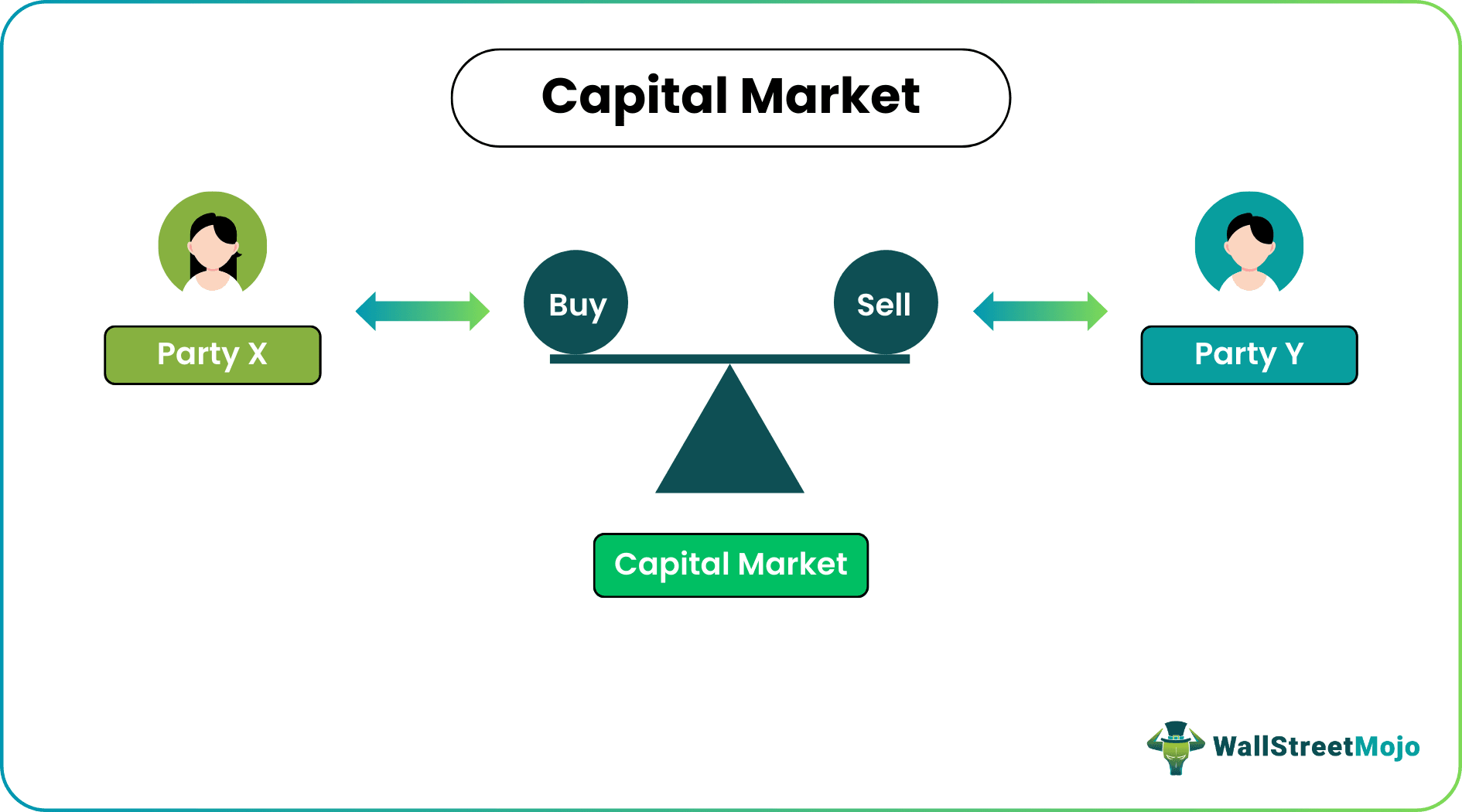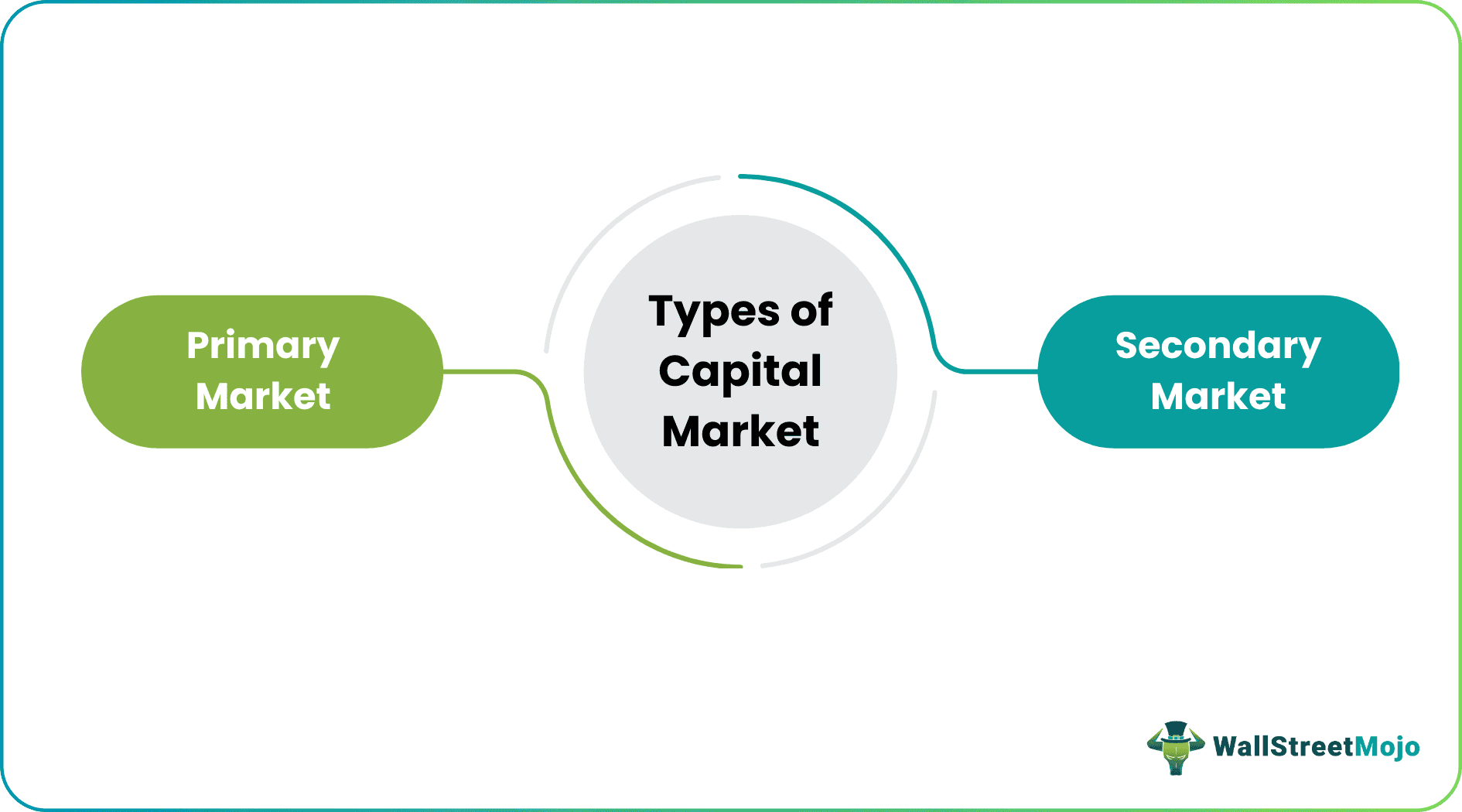Table Of Contents
What are Capital Markets?
A capital market is a place that allows the trading of funding instruments such as shares, debentures, debt instruments, bonds, ETFs, etc. It is a source for raising funds for individuals, firms, and governments.
The securities exchanged here would typically be a long-term investment with over a year lock-in period. On the other hand, short-term investments are usually found in the money market.
Key Takeaways
- A capital market provides individuals and firms with an avenue to raise funds for their needs and wants. It is of two types - primary market and secondary market.
- The market plays a crucial role in economic development. It mobilizes savings from individuals, banks, financial institutions, real estate, and gold, thus diverting savings from unproductive channels to productive areas.
- Commercial banks, financial institutions, individual investors, insurance companies, business corporations, and retirement funds are the major suppliers of funds in the market.
- There are usually long-term investments here, such as shares, shares, debt, government securities, debentures, bonds, etc. Stock exchanges operate the market predominantly.

How Does a Capital Market Work?
A capital market assists an economy by providing a platform to gain funds for business operations, development activities, or wealth enhancement. The functioning of a capital market follows the theory of the circular flow of money.
For example, a firm needs money for business operations and usually borrows it from households or individuals. In the capital market, the money from individual investors or households is invested in a firm’s shares or bonds. In return, investors gain profits as well as goods and services.
The market comprises suppliers and buyers of finance, along with trading instruments and mechanisms. There are also regulatory bodies. Stock exchanges, equity markets, debt markets, options markets, etc., are some capital market examples.
Many traders use Saxo Bank International to research and invest in stocks across different markets. Its features like SAXO Stocks offer access to a wide range of global equities for investors.
Types of Capital Market

#1 - Primary Market
The primary market is for trading freshly issued securities, i.e., first-time trading. It enables an initial public offering. It is also known as the new issues market.
Here, companies raise funds with the help of preferential allotment, rights issue, electronic IPOs, or the pre-selected issue of securities or private placement. Usually, like an investment bank, the intermediary attaches an initial price to the shares. Once the sale materializes, firms take their shares to the stock exchange to facilitate trading between different investors.
#2 - Secondary Market
The trading of old securities occurs in the secondary market, which occurs after transacting in the primary market. Both stock markets and over-the-counter trades come under the secondary market. We also call this market the stock market or aftermarket.
Examples of secondary markets are the London Stock Exchange, the New York Stock Exchange, NASDAQ, etc.
Money Market and Capital Market Video Explanation
Elements of a Capital Market
- Individual investors, commercial banks, financial institutions, insurance companies, business corporations, and retirement funds are some significant suppliers of funds in the market.
- Investors offer money intending to make capital gains when their investment grows with time. In addition, they enjoy perks like dividends, interests, and ownership rights.
- Companies, entrepreneurs, governments, etc., are fund-seekers. For instance, the government issues debt instruments and deposits to fund the economy and development projects.
- Usually, long-term investments such as shares, debt, government securities, debentures, bonds, etc., are traded here. In addition, there are also hybrid securities such as convertible debentures and preference shares..
- Stock exchanges operate the market predominantly. Other intermediaries include investment banks, venture capitalists, and brokers.
- Regulatory bodies have the authority to monitor and eliminate any illegal activities in the capital market. For instance, the Securities and Exchange Commission overlooks the stock exchange operations.
- The capital market and money market are not the same. Securities exchanged in the former would typically be a long-term investment with over a year lock-in period. Short-term investments trade in the money markets and include a certificate of deposits, bills of exchange, promissory notes, etc.
Functions of Capital Market
- It mobilizes parties' savings from cash and other forms to financial markets. It bridges the gap between people who supply capital and people in need of money.
- Any initiative requires cash to materialize. Financial markets are central to national and economic development as they provide rich sources of funds. For example, the World Bank collaborates with global capital markets to mobilize funds to achieve its goals, such as poverty elimination.
- The International Bank for Reconstruction and Development (IBRD) has assisted over 70 countries by raising nearly $ 1 trillion since the first bond in 1947. Likewise, a report suggested that the European Union companies need to turn to this market to manage their pandemic balance sheet as banks alone will not suffice.
- For the participants, the exchange instruments possess liquidity, i.e., they can be converted into cash and cash equivalents.
- Also, the trading of securities becomes easier for investors and companies. It helps minimize transaction and information costs.
- With higher risks, investors can gain more profits. However, there are many products for those with a low-risk appetite. In addition, there are some tax benefits obtained from investing in the stock market.
- Usually, the market securities can work as collateral for getting loans from banks and financial institutions.
Downsides
- Investments in shares and mutual funds are deemed risky as the investment is highly volatile due to market fluctuations. Therefore, there is a massive chance of losing money to market risks.
- Market fluctuations risk one’s investments and hinder a fixed income. Those who are investing their hard-earned savings, such as retired employees and senior citizens, will prefer the safety of their funds to high earnings.
- With the wide range of investment alternatives present in the market, an investor may not make a fruitful choice without professional advice.
- Trading of securities may involve a brokerage fee, commission, etc., increasing the cost of transactions.
Disclosure: This article contains affiliate links. If you sign up through these links, we may earn a small commission at no extra cost to you.
FAQs
Most markets are not perfectly efficient. The capital market is no exception, but to some extent, the prices of securities reflect that they have incorporated the current information in the market.
A capital market is where individuals and firms borrow funds using shares, bonds, debentures, debt instruments, etc. The most common example is a stock exchange such as NASDAQ, trading shares from different companies amongst investors.
They are of two types –
• Primary market – deals with fresh stocks.
• Secondary market – trading with old securities.

